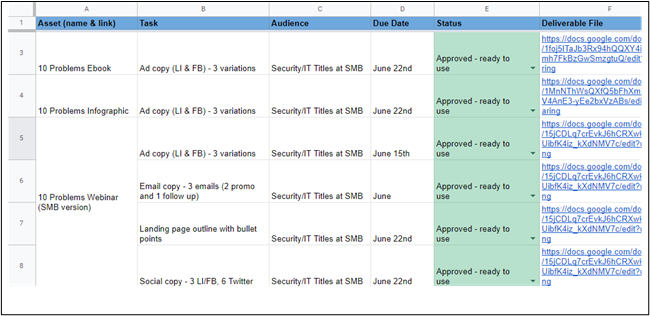First of all, yes, product marketing content can be outsourced effectively. Many freelance contractors are capable of understanding your complex product and creating essential content—from whitepapers to sales enablement collateral—to help drive revenue.
Wait, you say, Why not just hire another product marketer?
Two reasons: outsourcing is cheaper, and it can produce more content. Most product marketers get pulled into so many meetings and deliverables with engineering and product management that writing falls by the wayside. That frustrates demand generation and sales teams that are waiting for content.
A good product marketing contractor can focus on your content needs, and create spectacular content, without the interruptions that plague in-house product marketers. You just have to manage them effectively.
Read on for advice on how to work with contractors for a mutually beneficial engagement.
Find a great marketing contractor
Most companies need product marketing writing expertise in at least one of three areas:
- Expertise on their products (e.g., cybersecurity or supply chain management)
- Expertise on an industry (e.g., healthcare or manufacturing)
- Expertise on a buying persona (e.g., IT/CIO or Marketing/CMO)
Consider which of these are a must-have versus nice-to-have, then reach out to your network. LinkedIn is a great tool to search for someone with the appropriate experience, but it may be more effective to create a detailed post and ask your network to respond. Let them know what you are looking for, and you'll be surprised at the options that will surface. You can also reach out to investors. Most investors in startups have a good network of experts for hire who have helped them in the past.
Notice that I haven't mentioned freelance sites or placement agencies. You can certainly try them, but, in my experience, writers with a higher level of expertise don't list themselves on those sites or with those agencies.
Give contract product marketers what they need to be successful
Before any work is done, contract product marketers need to understand your brand and your process, as well as whom they will be working with.
What they'll need:
- Brand guidelines. Point out any issues that will be rejected by higher-ups. Some companies are really sensitive about fonts or contractions or the use of serial (Oxford) commas.
- Brand templates. Good writers will put design first, and write copy that fits your template, which saves loads of time in layout and review cycles.
- Samples of what is good (or bad). Share your best and worst and explain what makes them good or bad. That will help writers avoid repeating mistakes that have already been made internally.
- Introductions to designers and editors. Introduce your writers to the internal resources they will be working with, and allow them to have a level-setting conversation. Help them discuss the finer points for more successful interactions. For example, a designer may prefer design notes to be given in a comment or highlighted in a particular color.
- Chat access. Things will go more smoothly (and quickly) if writers are invited to your team chat for quick discussion and changes.
As each asset or project is assigned, give the writers the context they need to write successfully:
- Target audience. Writers have to know for which personas they are writing their piece, and they should also understand the pains those personas are feeling.
- Purpose and promotion. Let writers know how their assets will be used, where they will live, and how they will be promoted so they understand the duration and purpose of their piece.
- Access to subject-matter experts (SMEs). If SMEs are needed, ensure that writers have a direct line to the appropriate ones and that you have their buy-in to be interviewed. SMEs tend to respond more quickly to and more often keep scheduled meetings with contractors than with internal employees.
- Outline and reference content. Your in-house SMEs should follow all the right social channels, blogs, and publications to see the latest and greatest industry content. If there are references that should be used to develop the content or to be referred to in a piece, or if they can help to outline a piece, you need to supply that info to the writer. It will save time and improve the outcome.
- Clear expectations. Convey your expectations for each piece and the process. Do you want to review an outline first? How long do you want the piece to be? Do you expect writers to come up with ideas for graphics? That should all be clearly conveyed to the writer before the writing begins.
Invest in a long-term partnership
Historically, product marketing work has been contracted out on a project basis—a single whitepaper or a product launch, for example—which is not very effective, because each project requires ramp-up time.
Plan for a long-term relationship wherein the contract product marketing writer becomes a valuable extension of your team. To start off the relationship well, you might do the following:
- Give them a product demo.
- Present your go-to-market strategy.
- Explain running campaigns and content hierarchy.
- Let the writer speak with salespeople and SMEs.
You should train contract writers as you would new employees, which means you also need to spend the time to help them improve and give them feedback to help them learn your style and preferences. If you can give them consistent work, do so—to help keep them happy and ensure they are more readily available to meet your needs instead of being busy with other clients.
A great project for a new product marketing writer is a case study. You get the benefit of customers' being more willing to speak the truth when talking to a third party, and the writer gets the benefit of hearing firsthand the value of your product.
Create a simple way to manage deliverables
Not many people love to manage contractors, but with a few simple tools the task can be incredibly easy.
The first tool is a basic spreadsheet. It should include task, target audience, due date, status (including reviews/edits), document links, and comments. Ensure that it's kept current and that it's a shared document so that you and your writers can always see where things are.

Set clear deadlines and expectations, then ask your contractors to check-in with either a five-minute weekly call or a weekly email. Contractors should report on what they worked on that week, how many hours they spent, and what their plans are for the following week.
Protect their time
Product marketing contractors are more productive than in-house product marketers because of meetings—or rather, the lack thereof. Giving your product marketing writers uninterrupted time to write is the key to getting great results. Of course, you'll need to have a few meetings to convey information that your writers need, but they don't need to be involved in internal team meetings.
Also, you are the expert in your company operations and must ensure that content reviews are done, interviews are set up, and approvals are complete. Making contractors try to wade through internal dynamics is a recipe for failure.
Ask for their input
You are not perfect. Chances are that your contractors have worked with many marketing departments and seen the good, bad, and ugly of marketing. Don't miss out on this great opportunity to get an outsider's viewpoint on how you are doing—your process, your output, your website, etc. You may find a lot of opportunities to make improvements.




